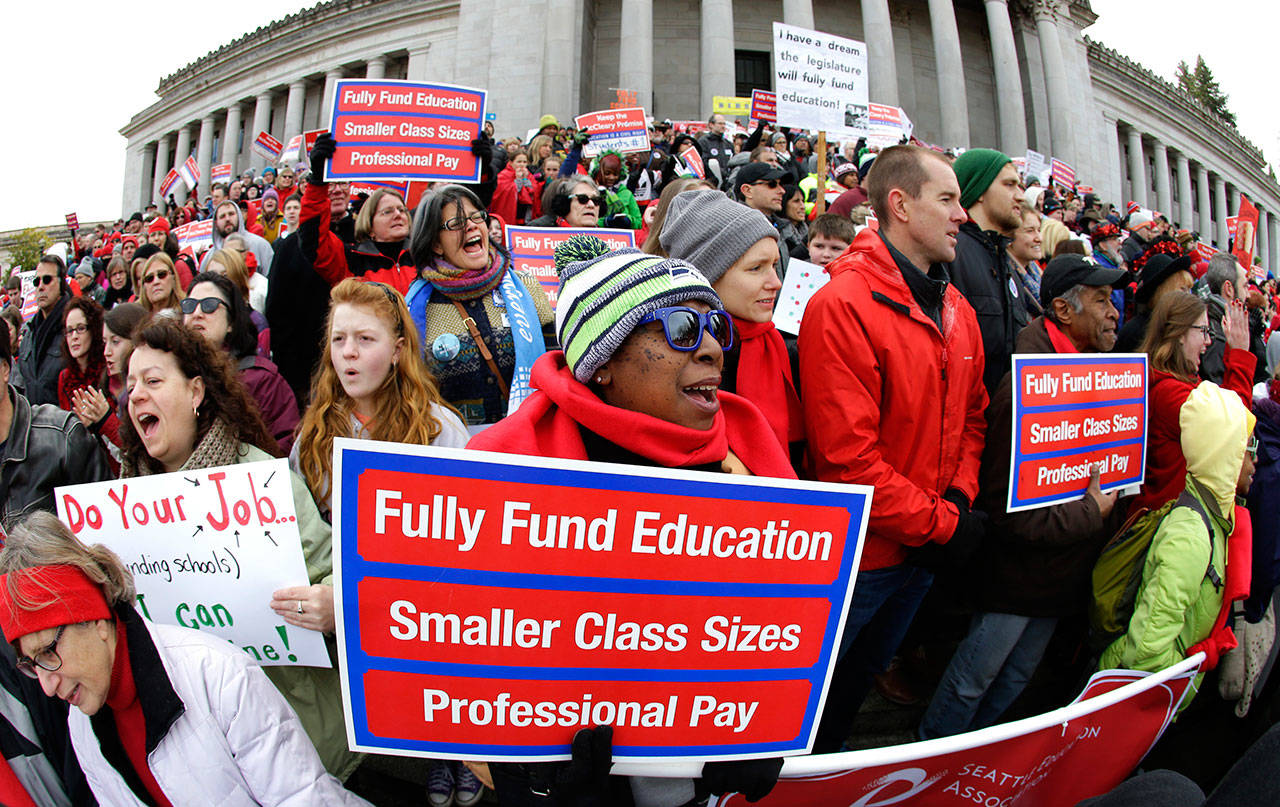By The Herald Editorial Board
The state Supreme Court poured half a glass for the Legislature regarding its work this year to fix state funding for K-12 education, a 2012 court mandate that the state amply provide for schools while ending the reliance on local school levies to pay for a significant portion of basic education.
For the optimists, the glass was half-full of recognition that the Legislature’s plan for full state funding of public K-12 education largely satisfies the mandate.
For the pessimists, the glass was half-empty, in that the court said the funding plan as adopted would not be fully in place by the court’s Sept. 1, 2018 deadline. And meeting that deadline would require, by the court’s estimate, about another $1 billion in spending approved during next year’s legislative session.
The unanimous ruling informed the Legislature that the court would maintain its jurisdiction in what’s known as the McCleary case, as well as its contempt of court order, and keep the clock running on a $100,000-day fine against the state that now totals around $83 million.
Most years, scraping together $1 billion during a legislative session would be a heavy lift. This coming legislative session, which begins Jan. 8, is scheduled for 60 days and will be that much more daunting. Recall that it took lawmakers nearly three full 30-day overtime sessions tacked onto the regular session this year to pass its McCleary fix and the state budget, and they did so with moments to spare before a partial state government shutdown at the end of June.
Lawmakers in both parties are not going to want to push the session much longer than 60 days. Next year is an election year for all House seats and the majority of Senate seats, and lawmakers are barred from campaign fundraising while the Legislature is in session. With this month’s Democratic win in a special election, the Democrats will hold a one-vote majority in the Senate, along with their two-vote majority in the House. Both parties will want to maximize their campaign time.
When they did pass the budget and the McCleary fix, lawmakers themselves acknowledged they had little time to fully review the plan and would have to make some changes next year. Education officials, school districts and others have suggestions.
Chris Reykdal, the state schools superintendent, agreed with the court that the Legislature’s work during recent legislative sessions had substantially increased education funding.
But Reykdal and school districts have faulted the Legislature for not providing enough funding for special education. The Everett School District has said that the state’s new formula for special education will leave a $10 million gap annually between what the state funds and what the school district is required to provide to meet federal requirements.
Reykdal, in a release, said the Legislature will need to provide the state’s school districts with an additional $130 million for special education programs for 2018, and $370 million more for 2019-21.
The state also needs to make adjustments to the biggest part of the funding mechanism that lawmakers put in place to shift funding responsibility to the state. The so-called “levy swap” increased the levy rate the state taxes to support schools by about 81 cents per $1,000 of assessed value but then cut back on the amount that each school district can seek in local school levies. School districts, under the legislation passed this year, will be limited to collect the lesser amount of either $1.50 per $1,000 of assessed value or $2,500 per student.
But those limits are a disadvantage for some districts and Reykdal suggests lawmakers allow districts to choose either amount as well as increase the cap amounts themselves so districts can fund programs beyond the basic instruction provided by the state.
School district officials, among them Everett’s Superintendent Gary Cohn, have said the state has yet to provide a clear definition of “basic education,” and thus what districts can support through local levies.
Lawmakers also threw out the existing salary schedule for teachers, which was based on seniority and advanced education, a move that many school districts see as limiting their ability to attract and keep good teachers. Bill Keim, executive director for the Washington Association of School Administrators, said in a release following the court’s decision that the salary schedule lawmakers replaced needs to be restored.
Finally, lawmakers need to adopt the $4 billion capital budget — and approve the bonds that fund it — that they failed to pass this year. The capital budget, along with funding a variety of projects in communities across the state, also includes about $1 billion for construction of new schools and classrooms, classrooms that schools need to lower class sizes and hire teachers. A refusal to approve that construction, in turn, limits schools’ ability to get the funding they need to hire the additional teachers and lower K-3 class sizes.
Whether lawmakers view the court’s decision as half-full or half-empty, what the Legislature has poured for the state’s 1.1 million K-12 students is not yet ample.
Talk to us
> Give us your news tips.
> Send us a letter to the editor.
> More Herald contact information.

























